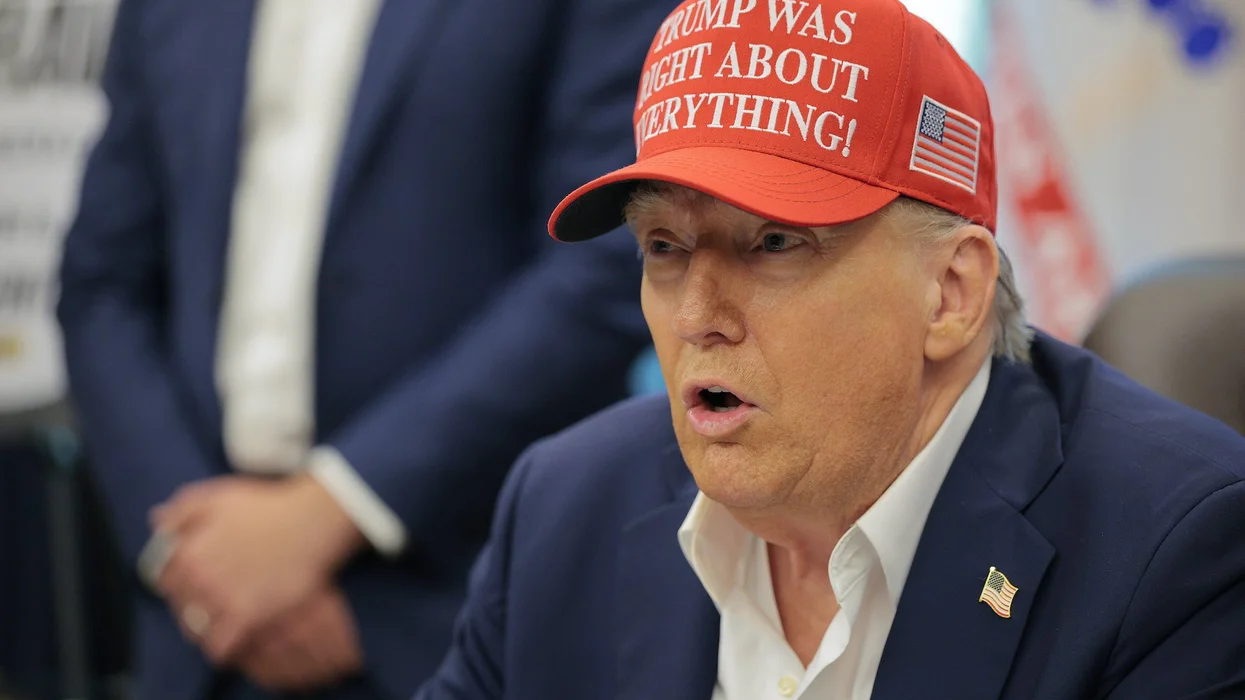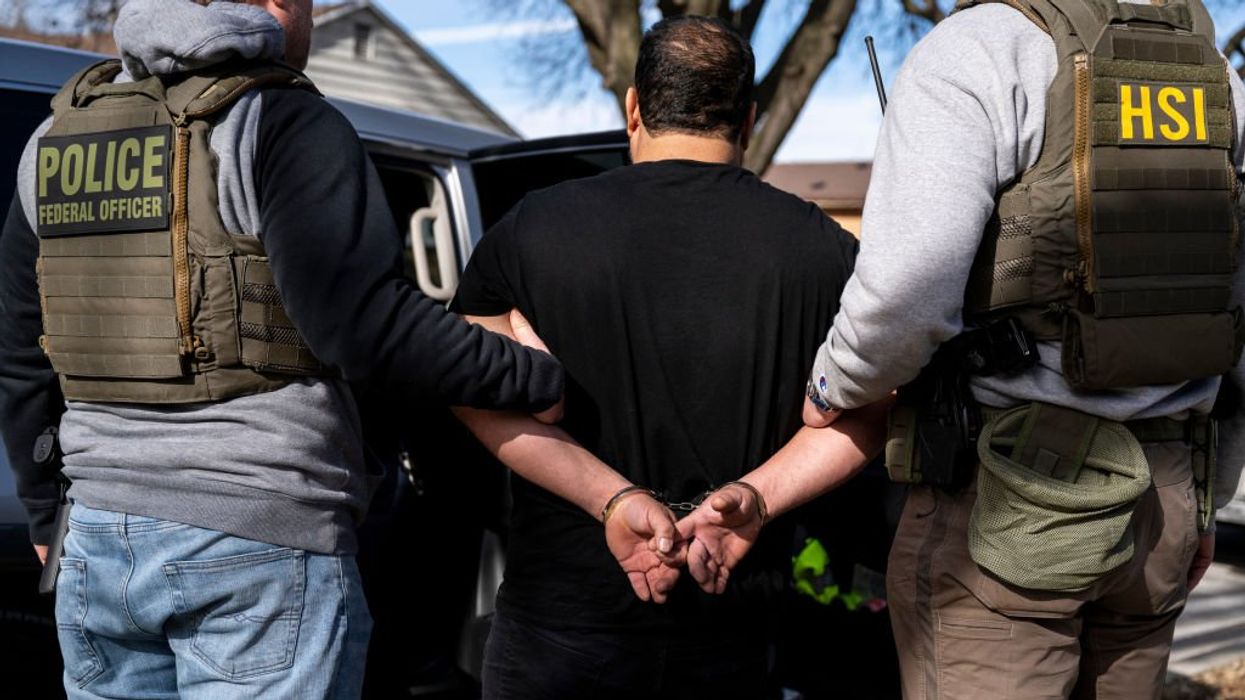
© 2025 Blaze Media LLC. All rights reserved.
Director of National Intelligence Warns of an ‘Abiding Threat’ That You’ve Been Hearing About on TheBlaze for Years
January 29, 2014
"We see this as a very serious national security issue."
 National Intelligence Director James Clapper says PRISM is "entirely legal" thanks to section 702 of the Foreign Intelligence Surveillance Act. (Getty Images)
National Intelligence Director James Clapper says PRISM is "entirely legal" thanks to section 702 of the Foreign Intelligence Surveillance Act. (Getty Images)
Mexican drug cartels and other organized crime syndicates in Latin America are a direct danger to the national security of the United States, the nation's top intelligence chief told lawmakers Wednesday.
The dangerous gangs threaten to dismantle fragile democracies throughout the world by creating a dangerous nexus with terrorist organizations who rely on illicit contraband for funding operations, Director of National Intelligence James Clapper said during a hearing before the Senate Intelligence Committee.
Clapper also warned that Transnational Organized Crime is an "abiding threat to U.S. economic and national security" and better cooperation with counterterrorism partners around the globe is essential as it is becoming more difficult to diffuse and detect terrorist groups.
TheBlaze has reported extensively on the horrifying reality of terrorist groups and ruthless Mexican drug cartels joining forces. Glenn Beck has also covered the topic in detail on his TV show.
(Related: Has Your City Been Infiltrated by Mexican Drug Cartels?)
"Criminals can play a significant role in weakening stability and undermining the rule of law in some emerging democracies and areas of strategic importance to the United States," Clapper said. "Mexican drug cartels are responsible for high levels of violence and corruption in Mexico. Drugs contribute to instability in Central America, erode stability in West and North Africa and remain a significant source of revenue for the Taliban in Afghanistan."
Mexico's growing drug war is presenting an even more precarious situation for Counterterrorism and Drug Enforcement Administration officials, as the chaos in the region leads to less security. Colombian and South American drug cartels only add to the national security threat, as the nexus between terrorists and drug traffickers is becoming more apparent to the intelligence community, DEA spokesman Rusty Payne told TheBlaze.
Drug cartels are more frequently moving cocaine and other contraband to areas throughout the world, like Africa, where they know they will receive less push-back from law enforcement and where lawless lands provide a safe-haven to conduct illicit business. These nefarious groups can move their contraband through African transit routes aided by terrorist organizations and criminal groups in the region, who provide passage to Europe, Payne added.
[sharequote align="center"]"We see this as a very serious national security issue."[/sharequote]
"We see this as a very serious national security issue," Payne said. "As terrorist organizations get less support and funding from state sponsors of terror — they are looking more to drug trafficking to raise funds for training, recruitment and operations."
Clapper's report to lawmakers warned that Transnational Organized Crime (TOC) throughout the world and the "fluid environment in the Middle East and North Africa will likely further complicate already challenging circumstances as we partner with governments to stem the spread of terrorism."
For example, Guinea-Bissau, in West Africa, which has been designated by the State Department as a narco-state is a key transshipment area for Colombian and South American cocaine. The area is also crawling with Al Qaeda off-shoots and other regional terrorist groups that purchase South American narcotics wholesale or cut deals with drug lords to move the cocaine through routes into Europe.
"These cartels set up shops in these West African countries because they are benefiting from these shipments and the terrorists benefit from the funding," Payne said. "We are in the midst of a major uptick in West Africa and working closely with our friends in the region because of these drug trafficking organizations."
There is a very real risk that terrorist organizations, who develop ties with drug cartels, could use transit routes through Mexico into the U.S. to ship weapons, contraband and people into the country and creates a greater need for intelligence collection in the region in an effort to stay ahead of the threat, a U.S. Official, familiar with the region told TheBlaze.
"Mexico's chaotic drug war and the southern border is certainly a major top concern for U.S. intelligence agencies and the military," said the U.S. official, who spoke on condition of anonymity due to the nature of their work. "Mexico is a shadow narco-state and drug cartels throughout Latin America are growing increasingly more savvy — sending contraband and narcotics throughout the world and connecting with subversive groups. It's all about access."
--
Want to leave a tip?
We answer to you. Help keep our content free of advertisers and big tech censorship by leaving a tip today.
Want to join the conversation?
Already a subscriber?
more stories
Sign up for the Blaze newsletter
By signing up, you agree to our Privacy Policy and Terms of Use, and agree to receive content that may sometimes include advertisements. You may opt out at any time.
Related Content
© 2025 Blaze Media LLC. All rights reserved.
Get the stories that matter most delivered directly to your inbox.
By signing up, you agree to our Privacy Policy and Terms of Use, and agree to receive content that may sometimes include advertisements. You may opt out at any time.





